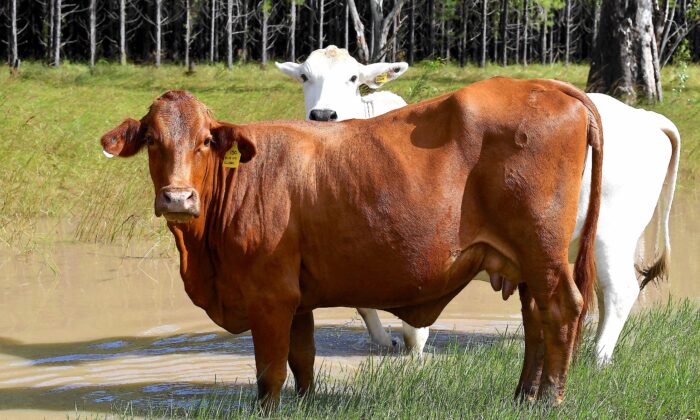The New Zealand government may opt for a strategy focused on preventing additional warming from methane, rather than achieving a significant reduction.
New Zealand, home to over six million dairy cows and nearly four million beef cattle, faces an outsized challenge in addressing methane emissions.
Dairy products alone account for nearly a quarter of the nation’s export earnings, valued at $23.7 billion in the year to March 2024.
Each cow belches around 100 kilograms (220 pounds) of methane each year. The world’s cattle are estimated to contribute as much as 14.5 percent of global greenhouse gas emissions.
When it came to power last year, the Coalition government of National, ACT, and New Zealand First, inherited a climate policy of cutting methane emissions by 24 to 47 percent of 2017 levels.
Although the country has committed to net zero by 2050, it carved out an exemption for biogenic methane, promising to reduce it by 24 to 47 percent below 2017, including a 10 percent reduction by 2030. This would achieve a result of “no added warming” from methane by that time.
The government called on a panel of scientists to examine whether the reductions proposed were consistent with achieving that objective.
On Dec 5, Minister for Agriculture Todd McClay released their findings, which show that a lesser target—of 14 to 15 percent—may be enough.
However, this depends on the performance of the rest of the world.
The target only applies in scenarios where global greenhouse gas emissions do not reduce rapidly in the next few decades.
If the rest of the world rapidly increases its climate policies to meet the Paris goal of limiting warming to 1.5 degrees Celsius, New Zealand would need to reduce biogenic methane emissions by 24 percent by 2050 to achieve no additional warming compared to 2017 levels by that date.
The level of emissions by other countries affects how much New Zealand’s methane emissions contribute to heat trapping, which is why the figure varies based on global actions
Debate Between Farmers and Climate Activists
The panel was not permitted to consider whether “no added warming” is an acceptable target, and the release of their report has prompted debate over that issue.
While the agriculture sector supports that objective, environmentalists say it is designed to lower ambitions and avoids addressing the country’s largest emitter.
McClay said the government is “committed to meeting New Zealand’s climate obligations without shutting down Kiwi farms. Our methane targets must be scientifically based and practical.”
“The government is investing more than $400 million over the next four years to accelerate the development and uptake of tools and technology that will help reduce on-farm emissions,” he said.
The Climate Change Commission is also expected to release its advice shortly. Based on the draft of its discussion document, it is likely to recommend against weakening any targets.
The Commission has a wider area of responsibility and can consider whether aiming for “no added warming” is a sufficient goal for the agricultural sector, taking into account impacts on trade and other factors.
In the past, the Commission has said lowering the methane target would place more of a burden on other sectors of the economy.
Officials Say It’s a Political Decision
Federated Farmers said it had “opposed the methane reduction target of 24 to 47 percent from day one, because they knew there was absolutely no credible science to underpin it.”
However, the Green Party called it a “smokescreen,” avoiding stricter rules by making its own team look into the issue instead of asking independent experts, like the Climate Change Commission.
“There’s a reason the government chose not to give this job to the independent, expert Climate Change Commission, but instead set up their own Ministerial pet project,” said Co-Leader Chloe Swarbrick.
Both sides are blaming each other for confusing science with politics.
Government officials had previously advised that setting a target was primarily a political matter, although the review would provide a useful update on the science.
“In practice, assessing the merits of this target is not principally a question of science,” they said in a review (pdf).
“Whether a no additional warming target ’makes sense’ depends on the government’s temperature goals, concerns about equity, desire to align with international agreements, and so on. It also depends on the base year, end date chosen for the target, and future warming scenarios considered.”

